Legal tip 797. Victory with Bank action in Corvera by CostaLuz-De Castro
Friday, June 29, 2012
For a phase 3 client, who had a guarantee covering just part of the payments he made.
Judge, using theories of Banks liability for the full coverage of guarantees, in complete protection to the buyer, has condemned Bank and developer jointly and severally to pay all amounts the purchaser deposited into the developers account, plus legal interests since day he made payments---5 years ago--- at a 4/5% rate.
Legal costs being imposed just to the developer.
Great news to finish the week with!
Maria
.jpg)
.png)
"Isla de Tarifa", Tarifa, Cádiz, South of Spain; at the top of the picture: Tánger, Morocco, África, at Facebook
 0
Like
Published at 4:20 PM Comments (9)
0
Like
Published at 4:20 PM Comments (9)
Legal tip 796. What to do with my illegal house?
Thursday, June 28, 2012
It might be that you can wait and are actually waiting or even acting for the obtention of the First Occupation License.
But it might also be that you cannot keep the mortgage repayments due to lose of job or incomes or want to sell it and cannot do it due to the lack of the said license.
Best solution in these cases is to act for cancellation of the whole business ( original private contract and subsequent public deed) due to lack of the said license. You can also deffend here the cancellation of the linked mortgage contract as the Supreme Court and numerous Appeal Courts have already deffended the nature of linked contracts of these two businesses.
This will also add force to a dation you might have started
.jpg)
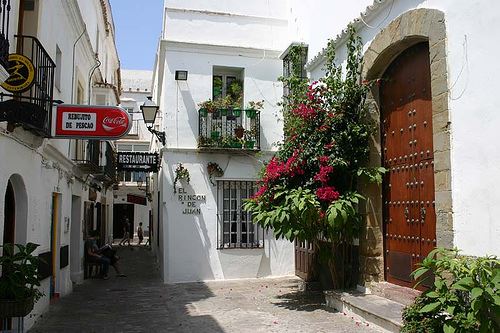
"Rincones de Tarifa, 2", Tarifa, Cadiz, South of Spain, by elarequi61, at flickr.com
 0
Like
Published at 12:47 PM Comments (0)
0
Like
Published at 12:47 PM Comments (0)
Legal tip 795. Hats
Wednesday, June 27, 2012
 0
Like
Published at 9:05 PM Comments (0)
0
Like
Published at 9:05 PM Comments (0)
Legal tip 794. To recreate Spain
Wednesday, June 27, 2012
I have been inspired today by this great interview to Sagardoy, one of the best Employment lawyers in the country. In fact, when walking to the Law Firm this morning, I was meditating kind of the same idea. We need to rediscover the richness of the old spanish values: community spirit, comradeship, helpfulness, commitment, truthfulness. It is important we understand them deeply as a joy and not as an obligation or a burden and that everyone chooses freely to conduct his life with them by his side. It is necessary that we are clear on the strength and the stability that they bring for us and for future generations.
Now, some great answers by Sagardoy in an interview published today by Expansion:
“We have to recreate Spain”
“We must accept a review of our ways of living and leave the collective madness of these years”.
“We believed that things had no limit and that terrible mistake has been a catastrophe”.
“People know now that things will never be like before. This has made a deep impression in the minds of people, and is very positive, because we need a change of habits and attitudes”.
“With the current political discredit, it is time for civil society. I am an advocate for civil society to move and have energy. I get very frustrated when the State is repeatedly called to fix things”.
“For young people with a University degree and no job I would say that with effort and enthusiasm they can get everything, although they now are in such adverse circumstances. Do not fall into despair at not finding a job. They must keep fighting and in the worst case, start their own business”.
"I could not live without friends. I do not understand life without friendship”
“I admire simple working people that have no history”.
“I always had an inboard engine to go beyond. The "non plus ultra", as a benchmark. Every day I try to get up with empathy, enthusiasm and energy. One gets old when illusions are replaced by cries”
.jpg)

"Tarifa and the wind....", Tarifa, Cádiz, South of Spain, by digitalnoise, at flickr.com
 0
Like
Published at 12:34 PM Comments (0)
0
Like
Published at 12:34 PM Comments (0)
Legal tip 793. Where should we find those leaders?
Tuesday, June 26, 2012
After reading the article below published by IESE Business School, and specially its last paragraph:
"Whether history will remember this moment as merely the growing pains of an ascendant monetary union, or the beginning of the dissolution of the European Union, will largely depend on whether a strong leader steps forward to take the reins."
- Where we should look for those leaders? There is no faith on politics and policy parties or organisations
- Should we better look in the academia? Good political scientist giving to us the route we need to take?
What do you think?
María
The Leaders Europe Needs
IESE Insight
Original document: The Leaders Europe Needs
Year: 2012
Language: English
icoPrint
icoFeedback
icoShare
As the euro crisis intensifies, alarming words such as "implosion," "disintegration" and "dissolution" have come to dominate the headlines.
Yet, with the euro zone's future hanging in the balance, competing national and E.U. interests continue to obstruct efforts by the region's leaders to formulate a strategic resolution of the crisis.
The resulting leadership void is arguably the greatest threat to the monetary union's future. To help shed light on the way forward, IESE professors share lessons from history and management.
Europe's Leadership Conundrum
During its first few years, the single currency seemed to enjoy robust health, gaining increasing strength against the dollar.
The risks posed by the growing real-estate bubble, a collapse of the banking sector and the gaping holes in the euro zone's own governance structures were barely, if at all, on the radar of E.U. policy makers.
Once the crisis did break, however, the region's response was eminently predictable: tensions and divisions arose among Europe's capitals, awakening dormant nationalist and protectionist sentiments.
Europe's de facto leader, Angela Merkel, faces an unenviable conundrum: how to stabilize the euro zone, while also placating her own national constituency, which is growing increasingly tired of bailing out countries that have proven incapable of managing their own finances responsibly.
"Merkel is lost in a maze," says IESE Prof. José Ramón Pin, "caught between the need to move forward with E.U. integration on the one hand, and, on the other, protecting the interests of German citizens, many of whose wallets are beginning to feel the pinch."
Germany's reluctance to embrace euro bonds, which would jointly be issued by 17 member countries to pool borrowing risk, has become the main obstacle to leading Europe out of the crisis.
"Leadership implies sacrifice," continues Pin, "and Germany does not understand its obligations as head of the European Union."
Merkel may strongly believe that her country's future lies within the European Union, that saving the euro and the union is worth the sacrifice, but she has been unable to communicate this vision to her national constituency.
Cometh the Hour, Cometh the Man
From history, we know that in any crisis of such magnitude, a vision that does not convince, captivate and align citizen support will fall flat. And leadership without vision is ineffective.
Recently IESE Dean Jordi Canals wrote in the Financial Times about Konrad Adenauer, West Germany's first chancellor, highlighting his ability to communicate and act on his vision, and the lessons today's leaders could learn from his example.
Faced with the daunting task of guiding a defeated, divided, and physically and emotionally drained country out of its darkest moment, Adenauer's ambition was resolute: to restore West Germany's place on the global stage.
Under his stewardship, the country bounced back surprisingly quickly, matching prewar GDP by 1951 and tripling its income between 1949 and 1963.
Under the shadow of the Soviet Union, Adenauer was committed to a free, prosperous Germany, fully integrated with Western Europe, as opposed to a united but neutral Germany constantly exposed to the Soviet Union's oversight and meddling.
Adenauer understood that important decisions meant difficult choices. German unification, therefore, would have to wait, while reuniting Europe took precedence.
"He reminds us of the importance of making choices, the courage necessary to do so, and the need to explain the implications of different options," says Canals.
According to Canals, "In today's politically divided European Union, it is time to remember that good leadership makes a difference -- leadership that uses a long-term perspective to address problems, that lucidly presents options to citizens, that puts national interests on a level with Europe's, and that has the courage to follow through on decisions."
Strong Leaders: Born or Made?
Courageous vision, knowing how to make difficult choices and having the ability to persuade are among the qualities that a strong leader must possess.
Whether strong leaders with these qualities are born or made is a topic of ongoing debate. According to IESE research, it is not an either/or dichotomy.
For example, IESE Prof. Santiago Álvarez de Mon contends that strong leaders may be shaped through hardship.
In his book Desde la adversidad. Liderazgo, cuestión de carácter, Álvarez de Mon highlights 21 prominent figures, including Vaclav Havel, Nelson Mandela and Intel's Andy Grove, who became effective leaders because of the hardships they confronted and overcame.
Leadership Tools
In addition to character, there are many tools that help forge great leaders. Being aware of what these are, and how to develop and use them, are also key to helping a potential leader blossom.
"Leaders, we are constantly told, need vision. Visions need to inspire, but if they lack the resolve to hold people accountable to a clear set of standards, then the visionary leader is discounted as nothing more than an ineffective idealist," says IESE's Brian Leggett.
According to Leggett and IESE colleague Conor Neill, the most vital tools for executive leadership -- managerial or political -- can be understood as the magnet and hammer.
The magnet encompasses leadership actions that create a pull toward a destination, including vision, storytelling, charismatic speaking and role modeling. These actions create the magnetic effect that helps to draw in support.
But after drawing in support, you need a hammer, or a set of leadership actions to drive change directly.
Such leadership actions include direct orders, control systems, hiring and promotions, job definition and financial incentives.
The balance between both tools is difficult, say Leggett and Neill. "The hammer must give way to the magnet, and vice versa, and all the while, there may be very little evidence that either tool is working. It requires a lot of patience, dedication and care."
According to Leggett and Neill, four practices can help leaders to implement the magnet and the hammer.
Developing a personal vision
Articulating that vision in a way that connects powerfully with your audience
Following through on your promises
Making sure everyone else fulfills their part of the bargain
Management Tools for Politicians
There is much that management can learn from politics and vice versa. Former French President Nicolas Sarkozy, for example, adopted a "management by objectives" approach as one of his "hammers."
"He wanted to show the French that his administration was not going to allow time or money to be wasted," says Pin.
Taken onto the broader European stage, with the arrival of a new French administration and continued German procrastination on the extent and type of financial assistance needed to resolve the euro zone crisis, Europe's leaders may do well to develop their leadership toolbox.
If anything, the dogged but ultimately misguided refusal of Spain's Prime Minister, Mariano Rajoy, to accept outside intervention in his country's economy, and the signs of growing hostility between the French and German governments, underscore the need for strong, united leadership.
Perhaps the lessons from Adenauer's post-war predicament may help put the current European crisis into perspective.
While the European Union's existential and financial crisis may pale in comparison with the challenges facing post-war Germany, its current predicament is nonetheless unprecedented and an exit uncharted.
Whether history will remember this moment as merely the growing pains of an ascendant monetary union, or the beginning of the dissolution of the European Union, will largely depend on whether a strong leader steps forward to take the reins.
"Tarifa", Kite-Surf in Tarifa, Cadiz, South of Spain, by MarKiddo, at flickr.com
 0
Like
Published at 10:27 PM Comments (0)
0
Like
Published at 10:27 PM Comments (0)
Legal tip 792. Spain: authenticity
Thursday, June 21, 2012
Wally Olins: "Mark Spain is passion and dedication"
Wally Olins is a symbol of branding and corporate image. He is currently the chairman of Saffron Branding Consultant
As a nation brand expert, he says that Spain has a strong value abroad. "It has never been so important as now. Since the sixteenth century, Spain has been in decline until 1975, when it still sounded like Spanish bullfighting, flamenco and Franco. But since then, Spain has achieved amazing results and it is important for the European Union for the first time in hundreds of years. Now every country has problems, but seen in perspective, the problem is very small compared with the achievements. "
To him Spain is "passion and dedication. It has a very strong personality and we, spaniards, need to trust it".
"It is important for Spain to better exploit its qualities: exports, sports, architecture, cuisine ... Tourism is very important, but not the only offer of Spain".
"Big crisis produce great people and great changes and achievements"
"Now authenticity is essential. And Spain is now obliged to call it. The authenticity of the Spanish. Spain is not only Bankia, it is much more"
We agree with him, and think, as described in this post from 2008 that brand words for Spain are: hospitality, people oriented, joy of sharing.
Come!
.jpg)
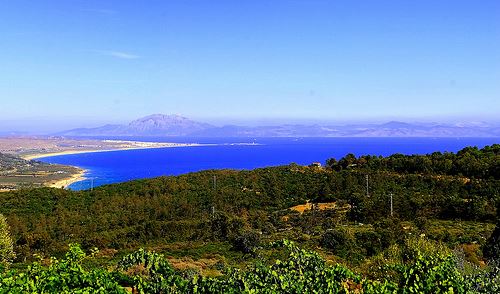
"La vista desde el Restaurante el Tesoro, Tarifa", Tarifa, Cádiz, South of Spain; by Chodaboy, at flickr.com
 0
Like
Published at 11:42 AM Comments (0)
0
Like
Published at 11:42 AM Comments (0)
Legal tip 791. Spain is a victim
Wednesday, June 20, 2012
Princeton Professor Angus Deaton, who will be tomorrow awarded With a BBVA prize.
In line with theory of clairvoyant Paul De Grauwe , Deaton sees clearly and encourages us no to lose time with incorrect solutions.
Deaton's Decalogue:
1. Spain is a victim of the economic chaos that exists in the European Union (EU)
2. This is a crisis created in Europe.
3. The solution to all problems facing the Old World cannot come exclusively from Spain.
4. The EU must step forward and try to find a joint solution.
5. Austerity is not the answer to the economic crisis.
6. Member states should agree to cut the austerity and increase investment
7. Europe should continue to promote education, public health and maintain their infrastructures
8. The Euro has a structural problem that will not disappear for many economic efforts to be made. The only thing that can be raised now is the European fiscal union, leading to the creation of a European government. This would cause a loss in democratic control of internal affairs-and will never solve the problem of unemployment. So it's a solution, but is it what we really want?
9. The output of the crisis will be very slow, but remains optimistic and think that very soon this difficult time will be only a historical episode more.
10. National administrations should not worsen the situation by lowering the investment in public health. A direct relationship between improved public health and development is proved. A healthy population work harder and get more revenue.
.jpg)
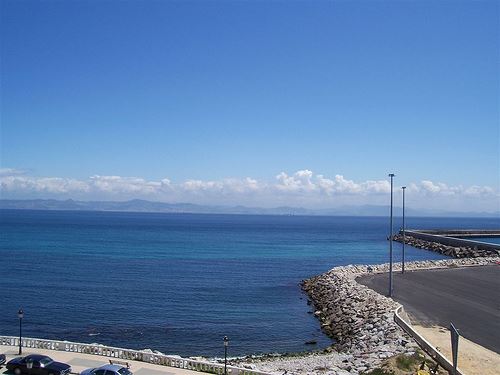
"Estrecho de Gibraltar", Tarifa, Cadiz, South of Spain; at the end of the picture: África--; by elholgazan, at flickr.com
 0
Like
Published at 12:00 PM Comments (0)
0
Like
Published at 12:00 PM Comments (0)
Legal tip 789. Come, we need you, now you can have an express oportunity
Monday, June 18, 2012
We are still waiting for the new government in Spain to pass the Act for promotion of Small and Medium Sized companies and Entrepreneurs. I hope this comes with good reductions on minimum social security amounts to be paid by new entrepreneurs at the beginning of their projects and tax aid to small and medium companies creating jobs.
In the meantime, it is good to know that the creation of companies can be made ( burocractically) in several days:
Those entrepreneurs thinking of starting his own company quickly can turn to organizations such as Circe (Information Centre and Business Creation Network), a system for the electronic processing of company formation.
Through Circe, 84% of limited liability companies (LLC) were processed within 4 days. And of these, 60% of the LLC is processed in less than a day. In the case of self-employed, there are cases of creation of individual entrepreneurs in fewer than 3 hours.
There are 1,109 PAIT (Information and first steps Points) located in fifteen communities, which provides information and advice to entrepreneurs and helps fill in the DUE (Sole electronic document).
There is a Virtual PAIT that allows creating a company with an electronic ID or digital certificate without having to resort to a physical PAIT.
If you do not speak Spanish and needs our help with this, please contact us at web@costaluzlawyers.es
We need you, foreign people, to build our entrepreneurs network and spirit.
.jpg)
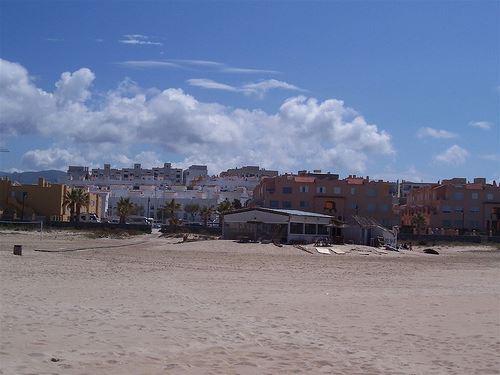
"Chiringuito BienStar", Tarifa, Cadiz, South of Spain, by elholgazan, at flickr.com
 0
Like
Published at 3:00 PM Comments (3)
0
Like
Published at 3:00 PM Comments (3)
Legal tip 788. Embrace the land
Sunday, June 17, 2012
 0
Like
Published at 9:33 AM Comments (0)
0
Like
Published at 9:33 AM Comments (0)
Legal tip 787.Market resurrecting after European Loans
Tuesday, June 12, 2012
Experts state that new European loans to Spanish Banks will obligue financial entities to make addittional efforts to reorganise their real estate stocks. Discounts could be of up to 50% over current prices. The reductions will be established after valuations by externals auditors of coming 21st o June.
A much desired collateral positive effect for consumers: price reductions on property stocks will possibly come according to opinion of Angel Serrrano, Manager of Businesses of Aguirre Newman.
Opinion of most of the analysts is that the Banks rescue will enable Banks to liquidate theie property and land stocks so that norman life can re-start
José Luis Marín director of CBRE thinks that this will put an end to the lethargy of Spanish Economy.
.jpg)
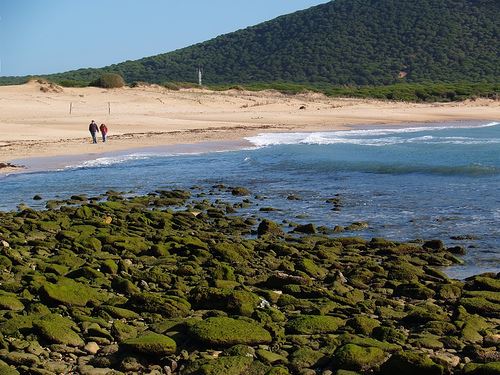
"Caños de Meca - Trafalgar", Vejer de la Frontera, Andalusia, Spain, by teclasorg, at flickr.com
 0
Like
Published at 2:01 PM Comments (0)
0
Like
Published at 2:01 PM Comments (0)
Legal tip 786. Press Release on Finca Parcs Victory
Sunday, June 10, 2012
PRESS / MEDIA RELEASE - FOR IMMEDIATE RELEASE
FINCA PARCS ACTION GROUP vs CAJA DE AHORROS DEL MEDITERRÁNEO (CAM BANK) & SPANISH DEVELOPER, CLEYTON GES SL
VICTORY FOR THE FINCA PARCS ACTION GROUP IN THE FIRST INSTANCE COURT
JUDGMENT CONDEMS CAM BANK & CLEYTON GES SL, JOINTLY AND SEVERALLY, TO RETURN THE DEPOSITS PAID BY THE GROUP MEMBERS WITH INTEREST AND LEGAL COSTS
FINCA PARCS ACTION GROUP – TIMELINE OF THE LAWSUIT
● No legally required Bank Guarantees for Off-Plan deposits totalling 1.5 million Euros
● Lawsuit against CAM Bank & developer Cleyton GES SL filed in February 2011
● First Instance Court Preliminary Hearing held on 12 January 2012
● Trial held on Monday 21 May 2012 & Tuesday 22 May 2012
● Judgment released in favour of Finca Parcs Action Group on Friday 8 June 2012
● CAM Bank and Cleyton GES SL must return deposits amounting to almost 1.5 million
euros to the buyers with the addition of legal interest and costs
JUSTICE
Justice was delivered in an overwhelming manner on Friday 8 June 2012 when the Judge in the First Instance Court in Hellín found in favour of 47 buyers who make up the Finca Parcs Action Group.
The court convicted jointly and severally both defendants, the developer Cleyton GES SL and the sole financial entity of the project, Caja de Ahorros del Mediterráneo (CAM), to return the off-plan deposits paid by group members totalling almost 1.5 million euros for houses that were never built at the abandoned Las Higuericas, Finca Parcs development close to Agramón, Albacete.
Furthermore, the judgment orders the payment of interest and costs.
The Judge declared the 55 sales contracts terminated due to “serious breaches” by the developer, in particular, “the long and indefinite delay in delivery of the properties, the failure to obtain the First Occupation Licences and the lack of Bank Guarantees for deposits paid by the buyers”. The Judge also stated that CAM Bank “failed in its legal obligations to control the use of off-plan deposits paid in advance for this development”.
STRONG SENTENCE
The sentence is strong and fully in favour of the buyers.
The decision of Consuelo Romero, Judge of the First Instance Court No.2 in Hellín was announced on Friday 8 June 2012 and concludes that both the developer and financial entity failed to fulfil their legal obligations.
The ruling requires CAM and Cleyton GES, jointly and severally, to return 1,494,710 Euros in off-plan deposits paid by 47 Finca Parcs Action Group members for 55 Sales Contracts, plus interest and costs.
The costs may represent a significant amount considering that the case was started in February 2011 and has accumulated over 5,000 pages in the Courts records. In addition 70 members of the Finca Parcs Action Group were forced to travel to Spain following the request to the Court by CAM Bank for all buyers to appear in person at the trial.
In the sentence the Judge states that, “this is not just a simple delay in the delivery of the housing but in this case it can be considered as an excessive delay that has obstructed the very purpose of the contract and broken mutual good faith”.
The Judge quotes the testimony of Keith Rule, who himself paid over 53,000€ in off-plan deposits to CAM Bank, during which Mr Rule when questioned by Cleyton GES said that under no circumstances would the buyers now be willing to accept a property from the 50 completed, but unlicensed houses on Phase 1, as the delay for the buyers already amounted to between 5 and 7 years from the signing of each individual contract and completion cannot be left to the discretion of the developer indefinitely.
The Judgment states expressly that “the lack of the First Occupation Licence is attributable exclusively to the developer” and that the lack of Bank Guarantees is also “cause for termination of the contract, since it is an obligation of legal and mandatory character”.
MISMANAGEMENT, NEGLIGENCE & MALPRACTICE
Regarding the involvement of CAM Bank, which claimed it has no relationship with the buyers, the detailed and comprehensive judgment also rules in this area. The Judge quotes extensively from the preamble of LEY 57/1968 and from the Law itself and says in this regard, “we cannot ignore the testimony of the purchaser who when interrogated said that the buyers were encouraged to pay reservation deposits at the development due to the promise of Bank Guarantees from CAM and because of the intense involvement of CAM as a financial partner not only in the promotional material but also in the contract”.
CAM maintained in their defence that it was oblivious to transactions in the two ‘current accounts’ into which the buyer’s money was paid. However, in view of the documents submitted as evidence and the testimonies of those who managed the transactions in CAM and Cleyton GES, the judgment states that,“The fact is that CAM knew that the payments into Cleyton GES accounts opened at the CAM branches were payments by buyers on account of off-plan real estate purchases and CAM failed in its obligations as a financial institution under LEY 57/1968 and this behaviour can be described as malpractice”. The Judge noted that “it is clear the off-plan deposits were used in a manner contrary to the requirements of Spanish Law, LEY 57/1968”.
The Judgment also refers to the ‘special account’ and notes that, “documents submitted corroborate that the value of Bank Guarantees issued by CAM to other buyer, not party to these proceeding, amounts to approximately 6.5 million Euros, however the total payments into the ‘special account’ amount to significantly less”. Furthermore, the Judge says that “other documents submitted during the course of the trial are of importance and very interesting items are the copies of CAM Bank Guarantees issued to other buyers, not party to these proceedings, as they describe as ‘Special’ the 2 accounts, that CAM maintained throughout the trial were just ‘ordinary’”.
CONCLUSION
The Judgment concludes:
“The truth is that CAM knew that the payments made by buyers into accounts at their branches were on account of real estate purchases and CAM showed absolute disregard to the obligations imposed on financial institutions by LEY 57/1968.
We must not forget that the obligation to deposit the amounts advanced to an account opened specifically for that purpose is that of the financial institution as not only does it receive the premium of the guarantees but also benefits by way of profit from the project. In fact, CAM was the only financial entity involved in the project as it demanded exclusivity.
The claimant questioned at the trial clearly demonstrated that the buyers contacted both the developer and Bank through multiple means urging them to grant the Bank Guarantees for the deposits paid”.
APPEAL
As in any First Instance Court decision the defendants have the right of appeal.
COMMENTS FROM FINCA PARCS ACTION GROUP
JAIME DE CASTRO - LAWYER
Jaime de Castro, the lawyer for the Finca Parcs Action Group said he was pleased with the ruling yesterday, and stressed that:
"It is technically flawless; it analyzes all the points, leaving no gaps and has forceful arguments that make it difficult to challenge. So I think that ultimately my clients will receive their refund in this case”
He noted that it is a decision which because of the significance of the case will be an important precedent for similar cases, and is also:
"Good for the image of Spain, its Justice System and even the financial system. Given the sensitivity of this type of issue in the United Kingdom, and the situation we are currently facing in Spain, it is good to convey the message that the system works and solves these issues fairly and expeditiously”.
KEITH RULE – COORDINATOR – FINCA PARCS ACTION GROUP
After the group coordinator, Keith Rule was informed of the decision, he said the group members were elated, but commented that "it has been a very stressful process and we have endured many years of struggle and effort to defend our rights"
Keith continues: “For us this is a great judgment. It is a credit to the work and determination of all those involved. This is an important judgment as none of the buyers received the Bank Guarantees as required by Spanish Law, LEY 57/1968. The wider significance of this judgment should not be underestimated.
I really think this case and Judgment will be studied far and wide. As the news spreads there will be many very interested observers.
Unfortunately it does not mean that every other buyer of off-plan property in Spain without the legally required Bank Guarantees will be able to follow the same course of action against the Bank. There were several specifics in this case and the volume of evidence gathered, in our opinion, is probably unprecedented. However, parallels can be drawn between this case and similar cases on other developments and undoubtedly this First Instance Court Judgment will be used, not as a precedent, as Case Law is only established by an Appeal Court or Higher Court, but as an argument in many other future Lawsuits.
KEITH RULE’S COMMENTS ON THE LIABILITES OF THE BANKS ACCORDING TO LEY 57/1968
The Finca Parcs Action Group is represented by Costa Luz Lawyers and De Castro Gabinete Jurídico. We are truly grateful for the professionalism, dedication, hard work and support of our legal team during the past 4 years. Special thanks go to María de Castro whom I first contacted in 2008 and to Jaime de Castro, our litigator, with whom I have had the pleasure of working with very closely on this case during the past 2 years.
It now seems strange to think that in 2007 when we first realised there was a problem with the Finca Parcs project I was unable to find a single Lawyer who shared my view that the Banks had a liability in these type of cases. That was until 2008 when I found María de Castro and Costa Luz Lawyers via the Eye on Spain internet forum. If a little sceptical at first María soon realised that I was not going give up and there was only one way forward – legal action against the developer and Bank. We encountered many hurdles along the way, not least from other Lawyers who, for various reasons, did not share our philosophy.
FAIR AND TIMELY JUSTICE
As I have said many times before, the Spanish Law which grants inalienable rights to protect off-plan purchasers is not new. It was introduced in 1968; the problem is that it has been conveniently ignored by the developers and financial institutions over the past decade. The Bank of Spain and Spanish Government failed to enforce the Law and many Court Judgments over the past few years have failed to apply LEY 57/1968 correctly. The ‘spirit’ of LEY 57/1968 and its preamble are of vital importance if one is to truly understand the purpose of the Law and the reasons for its introduction.
The Finca Parcs Judgment quoted extensively not only from the Law itself but from the preamble of LEY 57/1968 and it shows that when the Law is applied correctly the Spanish Justice System works and that fair and timely justice can be delivered.
For far too long Spain has alienated the very people who once helped the country prosper.
Now the Spanish Government must learn important lessons from this case and from the Bank Guarantees in Spain Petition (www.bankguaranteesinspain.com). If these types of Bank Guarantee cases are dealt with in a fair and speedy manner then maybe some of those people who have been the victims of negligence and malpractice may once again have the confidence to invest in Spanish property. After all that is what Spain wants and more importantly, desperately needs.
Right now as the Finca Parcs Action Group we are enjoying the moment and focussing on the positives. But we are realistic and understand that although we have made a massive leap forward in our fight for justice we are not yet over the finishing line. We will be making a preliminary enforcement of the Judgment but also preparing ourselves for any appeal that may be submitted by either defendant.
Should an appeal be forthcoming then it will be heard by the Appeal Court in Albacete and the decision of that court would then set a precedent and may be used as Case Law in other Lawsuits.
NOTE: BANK GUARANTEES AT LAS HIGUERICAS, FINCA PARCS
Other buyers at Las Higuericas, Finca Parcs who did receive the legally required Bank Guarantees from CAM, have during the past 3 years been able to execute their Bank Guarantees and receive refunds. However, some of these buyers also encountered problems and were forced into taking individual legal action to execute their Bank Guarantees as CAMinitially refused to honour the Bank Guarantees in many cases.
_______________________
BANK GUARANTEE PROBLEM?
CLICK HERE TO JOIN THE PETITION
  
fpag@btinternet.com
.jpg)
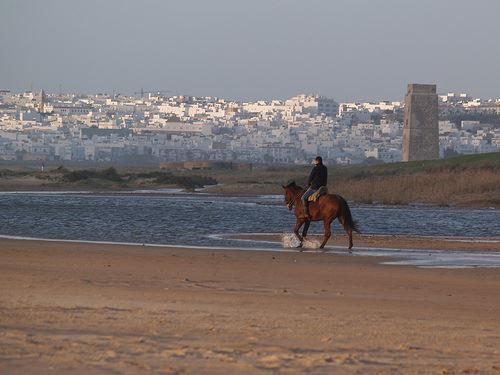
"Conil desde El Palmar de Vejer", El Palmar, Cadiz, Andalusia, Spain, by teclasorg, at flickr.com
 0
Like
Published at 3:38 PM Comments (0)
0
Like
Published at 3:38 PM Comments (0)
Legal tip 785. Spain did not create the problem
Saturday, June 9, 2012
The European Commission and the ECB must act now
08/06/2012 BY PAUL DE GRAUWE
 The seeds of the current crisis were sown nearly twenty years ago when European leaders agreed to create a currency without a country. Now, the Eurozone is split in two, with the creditor countries of the north able to borrow at next to zero interest rates, and those of the south facing massive deficits and economic instability. But both face a prescription of heavy austerity from the European Commission. Paul De Grauwe argues that the ECB and the European Commission can no longer afford to sit on the sidelines while the stability Eurozone continues to be undermined by those who fear for its future. The ECB must step in to guarantee the bonds of solvent but illiquid countries, such as Ireland, Spain, Portugal and Italy, the European Commission must encourage surplus countries to spend to offset the southern countries’ deficits, and the Eurozone must take steps towards budgetary union. The seeds of the current crisis were sown nearly twenty years ago when European leaders agreed to create a currency without a country. Now, the Eurozone is split in two, with the creditor countries of the north able to borrow at next to zero interest rates, and those of the south facing massive deficits and economic instability. But both face a prescription of heavy austerity from the European Commission. Paul De Grauwe argues that the ECB and the European Commission can no longer afford to sit on the sidelines while the stability Eurozone continues to be undermined by those who fear for its future. The ECB must step in to guarantee the bonds of solvent but illiquid countries, such as Ireland, Spain, Portugal and Italy, the European Commission must encourage surplus countries to spend to offset the southern countries’ deficits, and the Eurozone must take steps towards budgetary union.
As the Eurocrisis unfolds it is becoming more and more obvious that this is a self-inflicted crisis; a crisis that has been made possible by systematic mismanagement by the European leaders. Mismanagement started before the start of the Eurozone when European political leaders pushed us into a monetary union without at the same time putting a budgetary union in place. They could have been forgiven were it not that many economists warned for the creation of a monetary union that was not supported by a budgetary and thus political union. European political leaders went ahead and created a currency without a country, deluding themselves and large parts of public opinion that this would not be a problem.
Now that the crisis could lead to the destruction of the Eurozone, the same political leaders who did not know what they were doing when they started it all are walking in the dark again.
We are now starting to understand that financial markets in a monetary union can force individual governments into default, even governments that are willing and capable to service their debt. It is sufficient that investors fear some payment difficulties for a devilish dynamic to be set in motion: government bonds are massively sold, creating a sudden stop in liquidity provision and making it impossible for governments to service the debt without outside help. Thus, fear and panic can in a self-fulfilling way drive countries into default. Fear and panic are now the driving forces in the Eurozone, splitting the zone into two, pushing some into bad equilibria characterized by austerity and recession, and others into good equilibria allowing their governments to borrow at almost no cost.
Even today the ECB does not seem to recognize this problem. As a result, its strategy has been to wait and see. Thus, last year it waited until the sovereign debt crisis had sufficiently damaged the banking system and risked leading to an implosion. Close to the precipice, it decided to act and to provide massive amounts of liquidity to banks that were a multiple of what would have been necessary had the ECB acted earlier. Today as the Eurozone is hanging over the precipice again, the ECB again is sitting on the sidelines and waits for worse to come.
The problem with this strategy is that immense damage is done to confidence in the sustainability of the Eurozone. With each new crisis existential fears about the future of the Eurozone become more intense. Nothing undermines the stability of the Eurozone more than the increasing fear that the Eurozone has no future. And the ECB, which is the only institution that could calm these fears, is doing nothing. Existential fears are thus allowed to do their slow destructive work of undermining the Eurozone.
The European Commission has shown an equal capacity of mismanaging the crisis. Pushed by the creditor nations and the panicky financial markets, it is forcing Eurozone countries to accelerate austerity measures in the midst of a recession. As a result, the debt to GDP ratios increase as the denominator in this ratio is shrinking faster than the numerator. Countries end up with a higher debt burden, which triggers more panic reactions in the markets.
Again there is a failure to understand what is going on. The excess debt accumulation in the South is matched by an excess accumulation of claims in the North. The correct response would be to force the deficit countries to reduce and the surplus countries to increase spending. The European Commission’s strategy, however, forces all the adjustment on the deficit countries without imposing a symmetric and opposite adjustment on the surplus countries. As a result, the Eurozone is forced into a deflationary straitjacket.
This strategy is doomed to fail, as those who are subjected to the deflationary treatment show symptoms of rejection. It also leads to antagonism and conflict within the Eurozone. Southern countries are set up against the Northern creditor countries. The European Commission, which should promote the interests of the system as whole, has become the agent representing the interests of the creditor nations. Instead of unifying the Eurozone, the European Commission contributes to disunity and conflict.
The correct response to the crisis consists of three elements, all of which are key. First, the ECB should step in to stop panic and fear from undermining the stability of the Eurozone. It can do this by announcing that government bond rates of solvent but illiquid nations (Spain, Italy, Portugal, Ireland) will not be allowed to exceed a certain level (say, 300 basis points above the German government bond rate). The ECB is the only institution that can guarantee this, and stop the spread of existential fear that destroys the Eurozone. The EFSF and the future ESM have limited resources and cannot credibly commit to such an outcome.
Second, the European Commission should tell deficit and surplus countries alike to make the necessary adjustments. For the deficit countries this means austerity, albeit spread over a longer period. While the European Commission travels to the deficit countries and preaches austerity, it should also go to the surplus countries and urge them to stop trying to balance the budget when the Eurozone risks moving into a recession. The European Commission’s message should be that budget deficits in these countries are good for then and for the system.
Finally, steps towards a budgetary union are a key ingredient for moving towards a sustainable monetary union. Budgetary union is a long-term prospect. There is little prospect for achieving it quickly. What can be done quickly, however, is the issue of common Eurobonds. This approach has the merit of signaling to the market that irreversible steps towards budgetary union are being taken now, thereby taking away the existential fears abut the future of the Eurozone.
This column was first published on EUROPP@LSE
.jpg)
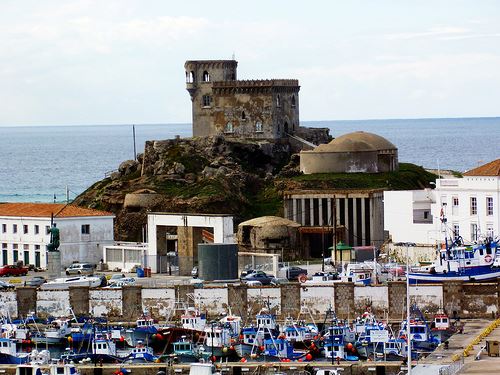
"Tarifa" ,Port of Tarifa, Cadiz, South of Spain, by von_boot, at flickr.com
 0
Like
Published at 12:45 PM Comments (0)
0
Like
Published at 12:45 PM Comments (0)
Legal tip 784. Finca Parcs: A Court victory positive for Spain
Saturday, June 9, 2012
As a show of how off plan property buyers in Spain are protected by Law, judicial and financial system
Jaime de Castro, the lawyer for the Finca Parcs Action Group said he was pleased with the ruling yesterday, and stressed that:
"It is technically flawless; it analyzes all the points, leaving no gaps and has forceful arguments that make it difficult to challenge. So I think that ultimately my clients will receive their refund in this case”
He noted that it is a decision which because of the significance of the case will be an important precedent for similar cases, and is also:
"Good for the image of Spain, its Justice System and even the financial system. Given the sensitivity of this type of issue in the United Kingdom, and the situation we are currently facing in Spain, it is good to convey the message that the system works and solves these issues fairly and expeditiously”.
Regarding the personal view of the buyers, after the group coordinator, Keith Rule was informed of the decision, he said they were elated, but commented that "it has been a very stressful process and we have endured many years of struggle and effort to defend our rights"
"Las Dunas, Playa de Valdevaqueros, Punta Paloma - Tarifa 3", Tarifa, Cadiz, South of Spain, by von_boot, at flickr.com
 0
Like
Published at 11:37 AM Comments (0)
0
Like
Published at 11:37 AM Comments (0)
Legal tip 783.VICTORY FOR FINCA PARCS ACTION GROUP IN THE FIRST INSTANCE COURT
Saturday, June 9, 2012
FINCA PARCS ACTION GROUP vs CLEYTON GES SL & CAJA DE AHORROS DEL MEDITERRÁNEO
Today (Friday 8 June) we received the judgment from the First Instance Court In Hellín:
The Judge found the developer Cleyton GES SL and the Bank - Caja de Ahorros del Mediterráneo (CAM) jointly and severally liable for the repayment in full of the deposits paid (1,494,710 Euros) under the 55 Sales Contracts which were the subject of the Lawsuit, together with legal interest and costs.
This is a significant judgment as none of the buyers received the Bank Guarantees as required by Spanish Law, LEY 57/1968.
The Finca Parcs Action Group are represented by Costa Luz Lawyers and De Castro Gabinete Jurídico. We are truly grateful for their dedication, hard work and support during the past 4 years. Special thanks go to María de Castro - back in 2008 she was one of the only Lawyers who believed in my view that the Banks had a liability in such cases and to Jaime de Castro, our litigator, with whom I have worked very closely during the past 2 years.
We are currently studying the Judgment in more detail and further information will follow soon.
As in every First Instance Court judgment the defendants have the right of appeal.
Kind regards
Keith
FINCA PARCS ACTION GROUP
.jpg)
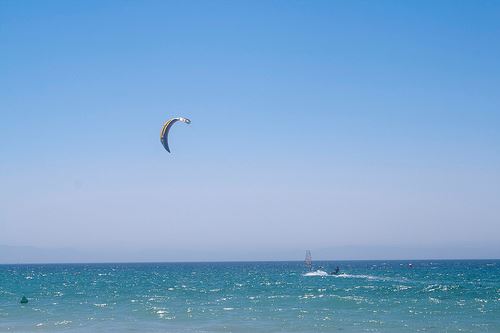
"Tarifa", Cadiz, South of Spain, by MarKiddo, at flickr.com
 0
Like
Published at 11:18 AM Comments (0)
0
Like
Published at 11:18 AM Comments (0)
Legal tip 782. Supreme Court and Banks risponsability
Thursday, June 7, 2012
This is how our Supreme Court sees Law 57/68. It was clearly pictured in a Court decission dated 8th of March 2001:
Law 57/69 of 27th of July 1968, on advanced amounts in off plan purchases establish in provision 1 that individuals or companies promoting buildings must - and being this an inalienable right of the buyer, according to provision number 7- when receiving money before or during the building process, guarantee the refund of those advanced amounts, and therefore must formalise an Insurance ( or a Bank Guarantee)
It can be deducted, that the essencial and social reason of this Law is to PROTECT the person who has risked important sums of money for the buying of a house - a generaly essential good for life- whish in under construction.
Therefore, for its application, only indispensable requirement are: the payment of advance sums and that the house has not been started or finished, being accesory and just a matter of discussion between guarantoor and builder, any other aspects.
siendo accesorias y propias de dilucidar las otras cuestiones planteadas, entre el asegurador y el constructor.
The depositing of amounts in the account mentioned by the Insurance policy or in any other agreed between developer and buyer is not a requirement for the refund to be viable.
Excellent!
.jpg)
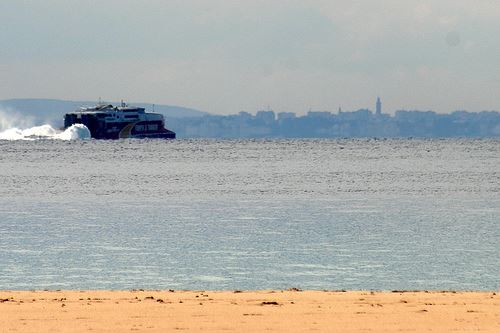
"Ferry Tarifa-Tanger, Tanger al fondo", Tarifa, Cadiz, Spain, by Chodaboy, at flickr.com
 0
Like
Published at 2:59 PM Comments (7)
0
Like
Published at 2:59 PM Comments (7)
Legal tip 781. Work culture or culture of effort 3
Thursday, June 7, 2012
Interesting observations by Josep Tàpies in El Pais when he describes the reasons why there is almost no unemployment among chinese population in Madrid.
Tàpies, who is the Director of Family Businesses department at IESE says that in terms of competitivity, culture and values deffended and promoted by chinese enterpreneurs they are not different to many generations of Spanish business men who created big emporiums through effort, work and long-term vision.
According to Pin, a successful chinese enterpreneur in Spain, the difference between the Spanish and the Chinese culture of work is that among Chinese, current generation wants to work more than their parents in order to achieve more welfare than them and between Spanish, people just want to live better than their parents.
An occidental disease possibly?
.jpg)
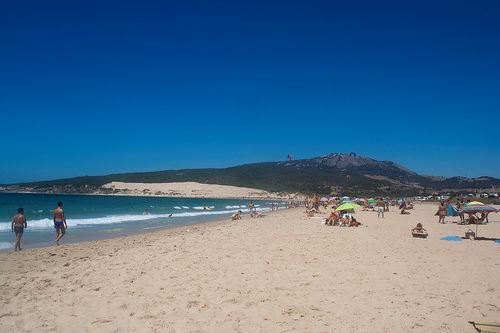
"Tarifa", Valdevaqueros, Tarifa, Cadiz, Spain, by MarKiddo, at flickr.com
 0
Like
Published at 2:25 PM Comments (0)
0
Like
Published at 2:25 PM Comments (0)
Legal tip 780. Work culture or culture of effort 2
Tuesday, June 5, 2012
Necessary to be taught through living and enjoying it and its wonderful effects and colaterals.
To our childrens since kindergarden.
Lack of this culture or dismissal of its importance is possibly the main reason the global financial crisis happened.... Internet just added the speed.
It is about building our dignity and satisfaction... let´s look at working with different glasses!
.jpg)

"Atardecer en Tarifa, Cadiz", Tarifa, Cadiz, Spain, by Chodaboy, at flickr.com
 0
Like
Published at 6:28 PM Comments (0)
0
Like
Published at 6:28 PM Comments (0)
Legal tip 779. Work culture or culture of effort I
Tuesday, June 5, 2012

.jpg)
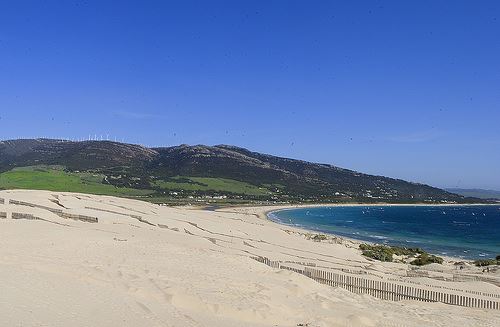
"Panoramica de las Dunas de Tarifa, Cadiz", Tarifa, Cadiz, Spain, by Chodaboy, at flickr.com
 0
Like
Published at 6:22 PM Comments (1)
0
Like
Published at 6:22 PM Comments (1)
Legal tip 778. Spain problems have a simple root
Monday, June 4, 2012
A simple and overall understanding of what is happening in Spain by Paul de Grauwe
"Thus, the Eurosystem bears a large part of responsibility in allowing bubbles in national housing markets and the associated increases in private debt to develop. These unsustainable developments ultimately forced the governments to step in. In doing so, they saved the financial system and prevented the economy from being pulled down in a deflationary dynamics. Reforms of the governance in the Eurozone should therefore not only focus on the responsibilities of national governments (and these are serious) but also on those of the European monetary authorities, and in particular those of the ECB.
To summarise: the creation of the Eurozone in 1999 was a big step forwards in the process of European integration. But it was unfinished business. No steps were undertaken to embed the monetary union into a political union. This had the effect, first, of leaving the Eurozone without instruments to prevent economic divergences in the Eurozone from developing. Second, it left the Eurozone without an insurance mechanism that could have been used to prevent contagion from leading to a systemic crisis"
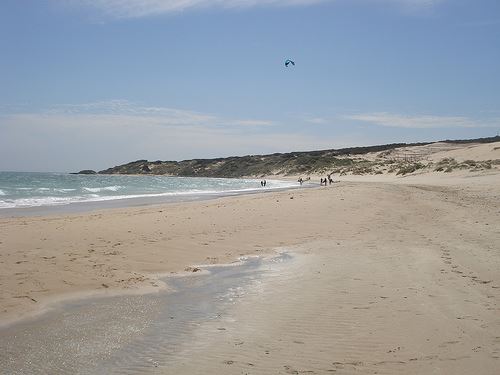
"Valdevaqueros", Tarifa, Cadiz, Spain, at flickr.com
 0
Like
Published at 10:57 AM Comments (0)
0
Like
Published at 10:57 AM Comments (0)
Legal tip 777. Spain and family solidarity
Saturday, June 2, 2012
A Quick letter I wrote today to an american friend:
Dear xxxxx:
Spain was a great country and since the Euro came, as a belgium ecomonist Paul De Grauwe was able to predict in 1998, things are worse and worse. I think this all has much to go with globalization and concentration of power and money in hands of very few people. Internet opened possibilities for things to happen faster and less controlled at every level.
A new way to understand economy and finances, based on the communal character of the human being, vs the old and failed individualistic understanding, is the only way out.
My country is coping with this huge levels of unemployment and financial crisis due to family solidarity mainly. This might be something to write about in the future.
You are always welcome to come and stay for a while here,
Kindest,
Maria
.jpg)

"Pano Tarifa - Valdevaqueros", Tarifa, Cadiz, Spain, by Nacho Romero, at flickr.com
 0
Like
Published at 12:37 PM Comments (1)
0
Like
Published at 12:37 PM Comments (1)
Spam post or Abuse? Please let us know
|
|